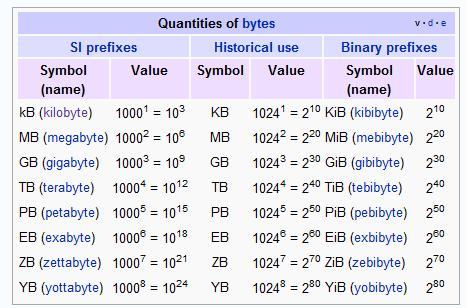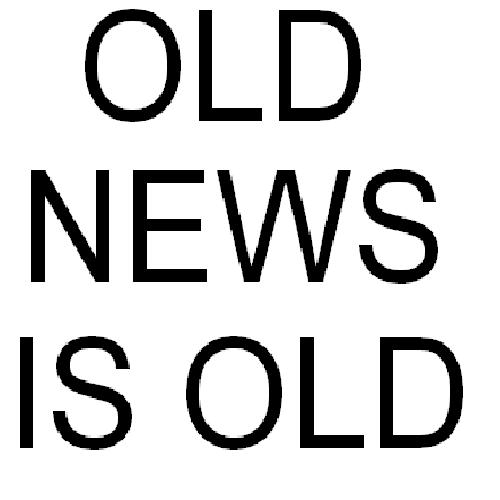Link
X depending on whether you ask a hard drive manufacturer who counts in base 10 or an OS coder who counts in base 10 (ha, a binary joke, thats 2 folks).
·Theme
- Forums
- Cross Site
- Out Of Topic
- 1000 bytes = X kb?
1000 bytes = X kb?Follow
I always thought it was 1024
who the hell started to use base 10 for bytes in the first place?
who the hell started to use base 10 for bytes in the first place?
manwithplanx wrote:
I always thought it was 1024
who the hell started to use base 10 for bytes in the first place?
who the hell started to use base 10 for bytes in the first place?
I'm not positive, but I think that the 1024 version has a slightly different spelling.
you might be thinking of bits
a byte is just a collection of bits
a byte is just a collection of bits
No, found it.

A 1024 cluster is a kibi. Wiki also says that kilobyte is 1000 bytes. It's standard metric, with bytes being the base unit.
Edited, Oct 27th 2007 8:11am by Lubriderm

A 1024 cluster is a kibi. Wiki also says that kilobyte is 1000 bytes. It's standard metric, with bytes being the base unit.
Edited, Oct 27th 2007 8:11am by Lubriderm
Lubriderm the Hand wrote:
I'm not positive, but I think that the 1024 version has a slightly different spelling.
I was bored, so I went to the wiki. http://en.wikipedia.org/wiki/Byte
Quote:
There has been considerable confusion about the meanings of SI prefixes used with the word "byte", such as kilo- (k or K) and mega- (M), as shown in the chart Quantities of bytes. Since computer memory comes in multiples of 2 rather than 10, the industry used binary estimates of the SI-prefixed quantities. Because of the confusion, a contract specifying a quantity of bytes must define what the prefixes mean in terms of the contract (i.e., the alternate binary equivalents or the actual decimal values, or a binary estimate based on the actual values).
Quote:
KB 10241 = 210 KiB (kibibyte) 210
Other interesting alternate words:
Quote:
Following "bit," "byte," and "nybble," there have been some analogical attempts to construct unambiguous terms for bit blocks of other sizes.[4] All of these are strictly jargon, not techspeak, and not very common.
2 bits: crumb, quad, quarter, tayste, tydbit
4 bits: nibble, nybble
5 bits: nickle
10 bits: deckle
16 bits: playte, chawmp (on a 32-bit machine)
18 bits: chawmp (on a 36-bit machine)
32 bits: dynner, gawble (on a 32-bit machine)
48 bits: gawble (under circumstances that remain obscure)
2 bits: crumb, quad, quarter, tayste, tydbit
4 bits: nibble, nybble
5 bits: nickle
10 bits: deckle
16 bits: playte, chawmp (on a 32-bit machine)
18 bits: chawmp (on a 36-bit machine)
32 bits: dynner, gawble (on a 32-bit machine)
48 bits: gawble (under circumstances that remain obscure)
Edit: Curse you ******* ringing telephones! CURSE YOU!!!
Edited, Oct 27th 2007 6:16am by Poldaran
the all holy mystery has been solved!
now I have no purpose :cry:
now I have no purpose :cry:
Either way, if you have a seagate drive, you are entitled to a 5% rebate 

prolly do I'll check later

y hallo thar
Usagi that image is too small you should make it bigger and more pixeleted-y.
Usagi that image is too small you should make it bigger and more pixeleted-y.
Princess Usagichan wrote:

link wrote:
Published: 26 Oct 2007 13:53 BST
Lubriderm the Hand wrote:
Princess Usagichan wrote:

link wrote:
Published: 26 Oct 2007 13:53 BST
I didn't actually read the link.

The whole 1000 vs 1024 thing is what I was refering to.
HEY USAGI, READ THE WHOLE DAMN THREAD BEFORE YOU REPLY ASSHOLE!
Edited, Oct 27th 2007 7:46am by Usagichan
Princess Usagichan wrote:
Lubriderm the Hand wrote:
Princess Usagichan wrote:

link wrote:
Published: 26 Oct 2007 13:53 BST
I didn't actually read the link.

The whole 1000 vs 1024 thing is what I was refering to.
HEY USAGI, READ THE WHOLE DAMN THREAD BEFORE YOU REPLY ASSHOLE!
Edited, Oct 27th 2007 7:46am by Usagichan
Unless I'm drunk, which is often.
For the record:
1 kilobyte is 1024 bytes. It is this way because computers operate in binary (0, 1, 2, ... 1024) or base 2, not base 10. Therefore, each segment of memory or disk space is also addressed in base 2, and thus, a whole segment of anything in computer language would never work out to exactly 1000. It has been this way since the dawn of all things electrical (0 = off, 1 = on), and will likely not change.
The only reason the whole (1KB = 1000B) thing came along was because hard drive manufacturers didn't want to be concerned with the details of the actual math, and it was easier early on to provide disk space in base 10 numbers, especially given the lack of education of the general public on the matter. For some reason, this standard has never evolved, even though the general education level has.
1 kilobyte is 1024 bytes. It is this way because computers operate in binary (0, 1, 2, ... 1024) or base 2, not base 10. Therefore, each segment of memory or disk space is also addressed in base 2, and thus, a whole segment of anything in computer language would never work out to exactly 1000. It has been this way since the dawn of all things electrical (0 = off, 1 = on), and will likely not change.
The only reason the whole (1KB = 1000B) thing came along was because hard drive manufacturers didn't want to be concerned with the details of the actual math, and it was easier early on to provide disk space in base 10 numbers, especially given the lack of education of the general public on the matter. For some reason, this standard has never evolved, even though the general education level has.
StubsOnAsura the Magnificent wrote:
For the record:
1 kilobyte is 1024 bytes. It is this way because computers operate in binary (0, 1, 2, ... 1024) or base 2, not base 10. Therefore, each segment of memory or disk space is also addressed in base 2, and thus, a whole segment of anything in computer language would never work out to exactly 1000. It has been this way since the dawn of all things electrical (0 = off, 1 = on), and will likely not change.
The only reason the whole (1KB = 1000B) thing came along was because hard drive manufacturers didn't want to be concerned with the details of the actual math, and it was easier early on to provide disk space in base 10 numbers, especially given the lack of education of the general public on the matter. For some reason, this standard has never evolved, even though the general education level has.
1 kilobyte is 1024 bytes. It is this way because computers operate in binary (0, 1, 2, ... 1024) or base 2, not base 10. Therefore, each segment of memory or disk space is also addressed in base 2, and thus, a whole segment of anything in computer language would never work out to exactly 1000. It has been this way since the dawn of all things electrical (0 = off, 1 = on), and will likely not change.
The only reason the whole (1KB = 1000B) thing came along was because hard drive manufacturers didn't want to be concerned with the details of the actual math, and it was easier early on to provide disk space in base 10 numbers, especially given the lack of education of the general public on the matter. For some reason, this standard has never evolved, even though the general education level has.
That being said, there is a concerted industry effort to eliminate this ambiguity. That is to say, 1 kilobyte is, and should be, 1000 bytes. 'Kilo' is an SI prefix that represents a factor of 1000 (10 to the third power). Early computer/electrical engineers commandeered the SI prefixes as approximations and they stuck.
The disambiguation is resolved by using the alternate 'kibi', 'mibi', 'gibi', etc prefixes that represent the binary equivalents of the SI prefixes. These are listed in Lubriderm's table. Unfortunately, the industry has been a bit slow in adopting this standard. I'm a proponent of this standard and use it my company's software.
Love,
PunkFloyd
PunkFloyd
OS coders went with 2^10 = 1024 bytes = 1kb, hard drive manufacturers went with 1000 bytes = 1 kb. I don't know why it wasn't standardized for everything one way or the other.
edit: NM was answered earlier with a chart that didn't load until after I posted XD
Edited, Oct 27th 2007 1:45pm by Ranzera
edit: NM was answered earlier with a chart that didn't load until after I posted XD
Edited, Oct 27th 2007 1:45pm by Ranzera
PunkFloyd the Flatulent wrote:
StubsOnAsura the Magnificent wrote:
For the record:
1 kilobyte is 1024 bytes. It is this way because computers operate in binary (0, 1, 2, ... 1024) or base 2, not base 10. Therefore, each segment of memory or disk space is also addressed in base 2, and thus, a whole segment of anything in computer language would never work out to exactly 1000. It has been this way since the dawn of all things electrical (0 = off, 1 = on), and will likely not change.
The only reason the whole (1KB = 1000B) thing came along was because hard drive manufacturers didn't want to be concerned with the details of the actual math, and it was easier early on to provide disk space in base 10 numbers, especially given the lack of education of the general public on the matter. For some reason, this standard has never evolved, even though the general education level has.
1 kilobyte is 1024 bytes. It is this way because computers operate in binary (0, 1, 2, ... 1024) or base 2, not base 10. Therefore, each segment of memory or disk space is also addressed in base 2, and thus, a whole segment of anything in computer language would never work out to exactly 1000. It has been this way since the dawn of all things electrical (0 = off, 1 = on), and will likely not change.
The only reason the whole (1KB = 1000B) thing came along was because hard drive manufacturers didn't want to be concerned with the details of the actual math, and it was easier early on to provide disk space in base 10 numbers, especially given the lack of education of the general public on the matter. For some reason, this standard has never evolved, even though the general education level has.
That being said, there is a concerted industry effort to eliminate this ambiguity. That is to say, 1 kilobyte is, and should be, 1000 bytes. 'Kilo' is an SI prefix that represents a factor of 1000 (10 to the third power). Early computer/electrical engineers commandeered the SI prefixes as approximations and they stuck.
The disambiguation is resolved by using the alternate 'kibi', 'mibi', 'gibi', etc prefixes that represent the binary equivalents of the SI prefixes. These are listed in Lubriderm's table. Unfortunately, the industry has been a bit slow in adopting this standard. I'm a proponent of this standard and use it my company's software.
As someone who's worked in the computer industry for over 10 years (yes, I was doing network support after school during high school), I can honestly say I've never found it to be a problem. However, I do agree that using alternate labels is a more appropriate solution than trying to change the actual values represented.
Recent Visitors: 316
All times are in CST
Anonymous Guests (316)
- Forums
- Cross Site
- Out Of Topic
- 1000 bytes = X kb?
© 2024 Fanbyte LLC
